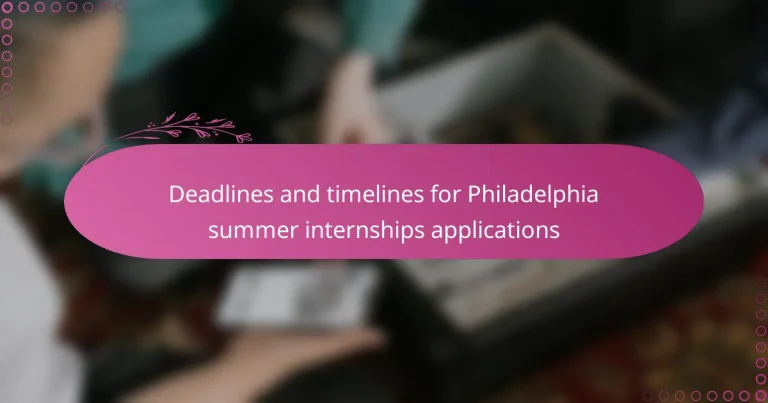

What are the key elements of a winning resume for Philadelphia summer internships?
The key elements of a winning resume for Philadelphia summer internships include a clear objective statement, relevant experience, and tailored skills. An objective statement should succinctly outline career goals and align with the internship role. Relevant experience must showcase internships, volunteer work, or projects that demonstrate applicable skills. Tailored skills should reflect the specific requirements of the internship, ensuring they match job descriptions. Additionally, education details should include degrees, relevant coursework, and honors. The resume should maintain a professional format, using consistent fonts and bullet points for readability. A winning resume often contains quantifiable achievements to illustrate impact, such as “increased social media engagement by 30%.” Lastly, including contact information at the top ensures easy communication for potential employers.
How can you effectively highlight your skills and experiences?
To effectively highlight your skills and experiences, use clear and concise language. Start with a strong summary statement that captures your key qualifications. Use bullet points to list relevant skills and experiences, making them easy to read. Tailor your skills to match the internship requirements. Include quantifiable achievements to demonstrate impact. For example, stating “increased sales by 20%” shows your contribution clearly. Use action verbs to convey your role in past experiences. This approach not only attracts attention but also provides evidence of your capabilities.
What specific skills should you emphasize for summer internships?
Emphasize communication skills for summer internships. Effective communication is essential in any professional setting. It includes both verbal and written skills. Employers seek candidates who can express ideas clearly. Teamwork skills are also crucial. Collaborating with others is often required in internships. Problem-solving abilities are highly valued. Interns should demonstrate analytical thinking and creativity. Time management skills are important for meeting deadlines. Adaptability shows readiness to learn and adjust in dynamic environments. Technical skills relevant to the field can enhance employability. Proficiency in software or tools specific to the industry can set candidates apart.
How can you showcase relevant experiences on your resume?
To showcase relevant experiences on your resume, include specific job titles and descriptions. Use bullet points to list achievements and responsibilities. Tailor these points to align with the internship requirements. Quantify accomplishments with metrics when possible. For example, state “increased sales by 20%” instead of “responsible for sales.” Highlight skills gained that are relevant to the internship. Include internships, volunteer work, and projects that demonstrate applicable experience. Ensure the format is clean and professional for easy readability.
What role does education play in your resume?
Education serves as a critical component of your resume. It showcases your qualifications and knowledge relevant to the position. Employers often prioritize educational background when assessing candidates. A degree or certification can demonstrate commitment and expertise in a field. Specific coursework or projects can highlight applicable skills. Including your GPA can further illustrate academic performance, especially for recent graduates. Education can also differentiate you from other candidates with similar experience. In competitive job markets, it may be a deciding factor in hiring decisions.
How should you present your educational background?
Present your educational background clearly and concisely. Start with your most recent degree. Include the name of the institution, degree obtained, and graduation date. Use a consistent format for each entry. If applicable, add relevant coursework or honors. Focus on achievements that align with the internship. This approach allows employers to quickly assess your qualifications. Research shows that clear presentation improves readability and engagement.
What additional certifications or courses can enhance your resume?
Certifications and courses that can enhance your resume include project management certifications, such as PMP or CAPM. These credentials demonstrate your ability to manage projects effectively. Additionally, certifications in data analysis, like Google Data Analytics, show proficiency in interpreting data. Technical skills can be highlighted through certifications like AWS Certified Solutions Architect or Microsoft Certified Azure Fundamentals. Language proficiency certifications, such as TOEFL or IELTS, can also make your resume stand out. Online courses from platforms like Coursera or edX can provide skills in coding or digital marketing. These certifications and courses are recognized by employers and can increase your job prospects.
Why is tailoring your resume important for internship applications?
Tailoring your resume is crucial for internship applications because it aligns your skills and experiences with the specific requirements of the position. Customized resumes demonstrate your genuine interest in the role. They also highlight relevant qualifications that make you a strong candidate. Research shows that recruiters spend an average of six seconds reviewing a resume. A tailored resume increases the likelihood of catching their attention. By focusing on pertinent experiences, you showcase your fit for the internship. This approach can significantly enhance your chances of securing an interview.
How can you customize your resume for specific internship opportunities?
To customize your resume for specific internship opportunities, tailor your content to match the job description. Start by analyzing the internship listing for required skills and qualifications. Highlight relevant experiences that demonstrate these skills in your resume. Use keywords from the job description throughout your resume to align with the employer’s expectations. Adjust your objective statement to reflect your interest in that specific internship. Showcase projects or coursework that relate directly to the internship responsibilities. Quantify your achievements to provide concrete evidence of your capabilities. Finally, ensure the formatting is clean and professional to make a strong first impression.
What research should you conduct before tailoring your resume?
Conduct research on the specific internship position and company culture. Understanding the job description helps identify required skills and experiences. Analyze the company’s values and mission to align your resume accordingly. Review industry standards and common practices for resumes in your field. Utilize job boards and company websites for insights into preferred qualifications. Gather information from current or former employees about what the company values in candidates. This research ensures your resume stands out and meets employer expectations.

What formatting tips can improve your resume’s effectiveness?
Use a clean and professional layout to improve your resume’s effectiveness. A well-structured format enhances readability. Utilize clear headings to organize sections such as education, experience, and skills. Keep font sizes between 10 and 12 points for body text and slightly larger for headings. Use bullet points for lists to make information easily digestible. Maintain consistent margins and spacing throughout to create a polished look. Limit your resume to one page if possible, especially for internships. Research indicates that hiring managers spend an average of 7 seconds reviewing a resume, so clarity is crucial.
How should you structure the layout of your resume?
Structure your resume layout with clear sections. Start with your contact information at the top. Follow this with a summary or objective statement. Next, list your education in reverse chronological order. Include relevant coursework and honors. After education, detail your work experience, also in reverse chronological order. Use bullet points for responsibilities and achievements. Add a skills section highlighting relevant abilities. Consider including additional sections for certifications or volunteer work. Maintain consistent formatting for readability. Use standard fonts and sizes for professionalism. Ensure adequate white space to avoid clutter.
What are the best practices for choosing fonts and sizes?
The best practices for choosing fonts and sizes in a resume include selecting a clean and professional font. Fonts like Arial, Calibri, and Times New Roman are widely accepted. Use a font size between 10 and 12 points for body text to ensure readability. Headings can be slightly larger, typically between 12 and 14 points. Consistency in font choice throughout the resume enhances its visual appeal. Avoid decorative or overly stylized fonts, as they can distract from the content. Adequate spacing between lines improves readability. Research shows that resumes with clear fonts and appropriate sizes are more likely to be read by hiring managers.
How can you use spacing and margins to enhance readability?
Using appropriate spacing and margins enhances readability by creating a clear visual structure. Adequate white space around text prevents overcrowding. This allows the reader to focus on each section without distraction. Standard margins of at least one inch are recommended for professional documents. Increased line spacing, such as 1.15 or 1.5, improves legibility. Consistent spacing between sections helps guide the reader through the content smoothly. Research shows that well-structured documents lead to better comprehension and retention of information. A study by the Nielsen Norman Group found that users read 20% more text on well-spaced pages. Therefore, effective use of spacing and margins significantly contributes to a resume’s overall readability.
What role do bullet points and lists play in your resume?
Bullet points and lists enhance the clarity and readability of a resume. They allow hiring managers to quickly scan for key information. This format highlights important skills, achievements, and responsibilities. Studies show that resumes with bullet points are more likely to be read. Bullet points also help organize content logically. Each bullet should focus on a single accomplishment or skill. This structure makes it easier for applicants to present their qualifications effectively. Overall, bullet points and lists are essential for creating a concise and impactful resume.
How can you effectively use bullet points to convey information?
Use bullet points to present information clearly and concisely. Bullet points help organize content, making it easier to read. They allow readers to quickly grasp key details. Each bullet should start with an action verb for clarity. Limit bullet points to one or two lines to maintain focus. Use parallel structure for consistency in tone and style. Avoid excessive punctuation and unnecessary words. Research shows that bullet points increase information retention by up to 20%. This method enhances the overall impact of your resume.
What types of lists are most effective for showcasing achievements?
Bullet points and numbered lists are the most effective types of lists for showcasing achievements. Bullet points provide clarity and make achievements easily scannable. They allow for concise presentation of each achievement. Numbered lists can illustrate a sequence or ranking of accomplishments. This format helps to highlight the most significant achievements first. Both formats enhance readability and organization on a resume. According to a study by TheLadders, recruiters spend an average of six seconds reviewing a resume. Clear and structured lists can capture attention quickly during this brief review.
Why is the length of your resume significant?
The length of your resume is significant because it impacts how hiring managers perceive your qualifications. A concise resume, ideally one page, allows for quick scanning and highlights key experiences. Research indicates that recruiters spend an average of six seconds reviewing a resume. Therefore, brevity ensures that essential information stands out. Conversely, a lengthy resume may lead to important details being overlooked. It can also signal a lack of focus or inability to prioritize information. Maintaining an appropriate length increases the chances of capturing attention and securing an interview.
How long should a resume for a summer internship be?
A resume for a summer internship should be one page long. This length is standard for students and recent graduates. It allows candidates to highlight relevant skills and experiences concisely. Recruiters typically prefer brevity due to time constraints. A one-page resume encourages clarity and focus on key qualifications. Many career services recommend this length for effective job applications.
What content can you omit to keep your resume concise?
Omit irrelevant work experience to keep your resume concise. Focus on positions that relate to the internship. Remove outdated skills that are no longer relevant. Exclude personal information like age or marital status. Avoid lengthy descriptions; use bullet points instead. Limit education details to the most recent degree. Skip references unless specifically requested. Keep the resume to one page for clarity and brevity.

How can you ensure your resume stands out to employers?
To ensure your resume stands out to employers, tailor it specifically for the job you are applying for. Use keywords from the job description to match your skills and experiences. Highlight your most relevant achievements at the top of your resume. Use a clean, professional format that is easy to read. Incorporate quantifiable results to demonstrate your impact, such as “increased sales by 20%.” Keep your resume concise, ideally one page for internships. Utilize bullet points for clarity and organization. Finally, proofread carefully to eliminate any errors that could detract from your professionalism.
What common mistakes should you avoid when writing your resume?
Common mistakes to avoid when writing your resume include using generic templates. Customized resumes stand out more effectively. Another mistake is including irrelevant information. Focus on skills and experiences that relate to the internship.
Additionally, avoid typos and grammatical errors. These mistakes can create an unprofessional impression. Failing to quantify achievements is another common error. Use specific metrics to demonstrate your impact.
Lastly, neglecting to tailor your resume for each application can be detrimental. Each internship may require different skills and experiences to highlight.
How can typos and grammatical errors affect your application?
Typos and grammatical errors can significantly undermine your application. They create an impression of carelessness and lack of attention to detail. Recruiters often view such mistakes as a reflection of your professionalism. A study by CareerBuilder found that 58% of hiring managers consider typos a deal-breaker. This can lead to your application being discarded without consideration. Clear and polished writing is essential to convey competence. Therefore, it’s crucial to proofread your application thoroughly to avoid these pitfalls.
What clichés should you steer clear of in your resume?
Avoid clichés like “hardworking” and “team player” in your resume. These phrases lack specificity and do not differentiate you from other candidates. Instead, focus on concrete skills and achievements. Use quantifiable results to showcase your contributions. For example, mention projects you led or specific metrics you improved. This approach provides clearer evidence of your capabilities. It makes your resume more engaging and memorable to employers.
What are some best practices for finalizing your resume?
To finalize your resume effectively, ensure that it is error-free. Proofread for spelling and grammatical mistakes. Use professional formatting to enhance readability. Consistent font size and style improve presentation. Tailor your resume to the specific internship by highlighting relevant experiences. Focus on achievements rather than just duties to demonstrate value. Include keywords from the job description to pass applicant tracking systems. Save your resume in PDF format to maintain formatting. Lastly, keep your resume concise, ideally one page, to ensure clarity.
How can you seek feedback on your resume before submission?
Seek feedback on your resume by sharing it with trusted peers or mentors. They can provide insights on clarity, formatting, and content relevance. Utilize online platforms like LinkedIn to connect with professionals in your field. Join resume review groups or forums for diverse perspectives. Consider utilizing university career services, which often offer resume critiques. Research shows that peer feedback can enhance the quality of job application materials. A study by the National Association of Colleges and Employers found that resumes reviewed by others are more likely to lead to interviews.
What tools or resources can help you polish your resume?
Resume polishing tools include online platforms, templates, and professional services. Websites like Canva and Zety offer customizable resume templates. Grammarly helps enhance grammar and clarity in your writing. Jobscan analyzes your resume against job descriptions for keyword optimization. LinkedIn provides networking opportunities and insights into industry standards. Professional resume writers can offer personalized feedback and editing services. Utilizing these resources can significantly improve the quality and effectiveness of your resume.
What practical tips can enhance your resume writing process?
Tailor your resume for each position. Customization increases relevance to the job description. Use keywords from the job listing to match your skills. Keep your resume concise, ideally one page for internships. Highlight relevant experiences and achievements clearly. Use bullet points for easy readability. Quantify accomplishments with specific metrics, like percentages or numbers. Ensure consistent formatting for a professional appearance. Proofread to eliminate errors and typos, as they can undermine credibility.
The main entity of this article is the winning resume for Philadelphia summer internships. It outlines key elements essential for crafting an effective resume, including a clear objective statement, relevant experiences, tailored skills, and education details. The article emphasizes the importance of formatting, readability, and the strategic use of bullet points to showcase achievements. Additionally, it provides practical tips for customizing resumes to align with specific internship requirements, highlighting the significance of quantifiable accomplishments and professional presentation. Overall, the article serves as a comprehensive guide for applicants seeking to enhance their resumes for summer internship opportunities.




